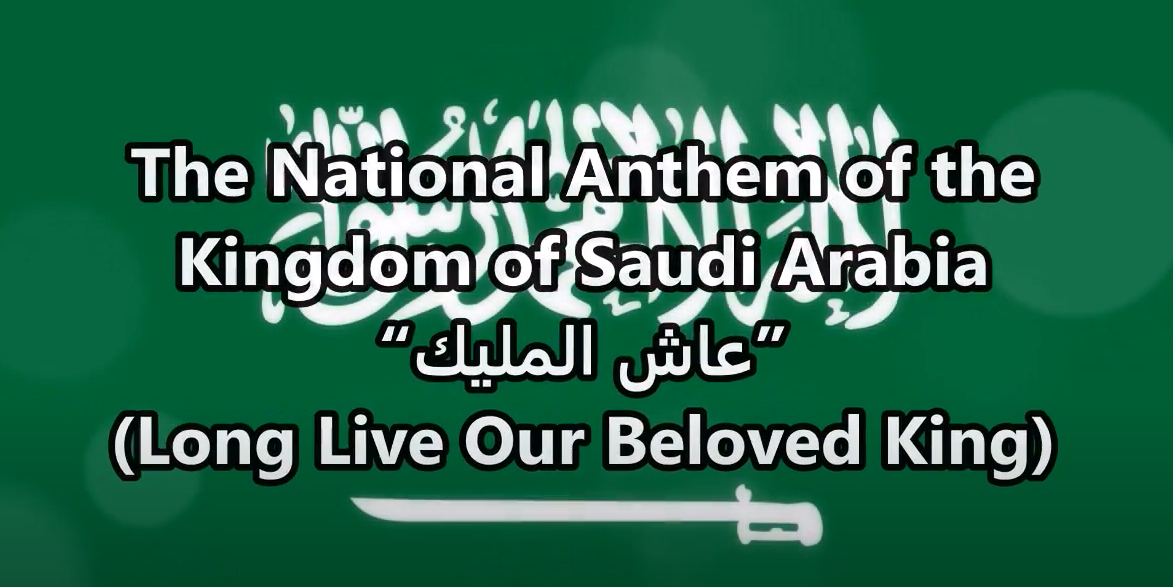Every year on September 23rd, Saudi Arabia celebrates its Saudi National Day.
This special date commemorates the historic unification of the Kingdom under the leadership of King Abdul Aziz Bin Abdul Rahman Al Saud in 1932.
Now, let’s look into the rich history and significance of the Saudi Arabia National Anthem.
History of Saudi Arabia National Anthem
Saudi Arabia’s National Anthem, known as “Āsh al-Malīk,” is deeply respected by Saudi people and represents the Kingdom’s history, culture, and togetherness.
It’s close to their hearts.
This anthem, composed by Abdul-Rahman Al-Khateeb with lyrics by Ibrahim Khafaji, represents Saudi Arabia’s heritage and progress.
Creation of Saudi Arabia’s National Anthem
In 1950, King Abdulaziz of Saudi Arabia adopted a royal salute to represent the country because Saudi Arabia didn’t have an official national anthem.
While visiting Egypt, King Abdulaziz asked an Egyptian composer, Abdul-Rahman al-Khatib, to create a national anthem, and that’s how “Āsh al-Malīk” was born.
Before this anthem, they used another one called “Salamati,” composed by Abdulrahman Al-Sayigh during the reign of King Abdulaziz, but it was replaced to represent Saudi values and history better.
Evolution of the Saudi National Anthem
In the early 1980s, King Khalid wanted the anthem to reflect the poetic traditions of the Arab people. So, he asked a Saudi poet named Ibrahim Khafaja to add beautiful poetry to the anthem.
Lyrics: The anthem’s lyrics are in Arabic and show the Kingdom’s values and dreams.
Anthem Lyrics in Arabic
Aash Al Maleek (Long live the King)
Sarei Lil Majd Walalya
Majjedi Le Khaleg Assama
Warfai El Khaffag Akhdar
Yahmil Annoor al mosattar
Raddedy Allah Wakbar
Yamawteni Mawtenii Gad
Isht Fakhr Al Moslemeen
Aash Al Maleek Lelalam Walwatan.
Anthem Lyrics in English
Hasten to glory and supremacy!
Glorify the Creator of the heavens
And raise the green, fluttering flag,
Carrying the emblem of Light!
Repeat – God is greatest!
O my country,
My country, may you always live,
The glory of all Moslems!
Long live the King,
For the flag and the country!
Meaning
- Aash Al Maleek (Long Live the King): This phrase expresses loyalty and support for the King and the unity of the country under his leadership.
- Sarei Lil Majd Walalya (Hasten to Glory and Supremacy): This line emphasizes the importance of striving for glory and supremacy as a nation.
- Majjedi Le Khaleg Assama (Glorify the Creator of the Heavens): It calls for the glorification of the Creator of the universe, highlighting the importance of faith and spirituality.
- Warfai El Khaffag Akhdar (Raise the Green, Fluttering Flag): This line refers to raising the national flag, symbolizing the unity and identity of the country.
- Yahmil Annoor al Mosattar (Carrying the Emblem of Light): It signifies the idea that the flag carries the emblem of light, representing enlightenment and progress.
- Raddedy Allah Wakbar (Repeat – God is Greatest): Repeating “God is Greatest” emphasizes the importance of faith and devotion.
- Yamawteni Mawtenii Gad (O My Country, My Country, May You Always Live): Expresses a deep love and devotion to the homeland, wishing for its eternal prosperity and existence.
- Isht Fakhr Al Moslemeen (The Glory of All Moslems): Highlights Saudi Arabia’s significance in the Muslim world, symbolizing a sense of pride among Muslims.
- Aash Al Maleek Lelalam Walwatan (Long Live the King, For the Flag and the Country): Reiterates support for the King and emphasizes the importance of the flag and the nation.
Significance
The anthem is very important to Saudi people. It fills them with pride and unity. It represents loyalty to the country and a strong connection between the rulers and the people.
It’s played at important events and celebrations, making Saudis feel proud and united.
Wrap-Up
The Saudi National Anthem, “Āsh al-Malīk,” symbolizes Saudi pride and unity.
It reminds everyone about their heritage and why their homeland is important.
